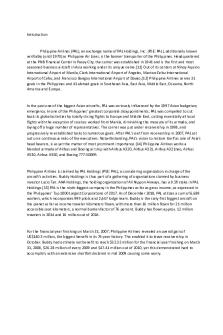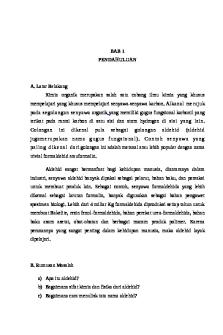DB2 6122021 - paper. PDF

| Title | DB2 6122021 - paper. |
|---|---|
| Author | cedric stone |
| Course | International Business |
| Institution | Liberty University |
| Pages | 4 |
| File Size | 147.6 KB |
| File Type | |
| Total Downloads | 35 |
| Total Views | 131 |
Summary
paper....
Description
Discussion: External Environments/Risk/Global Trade & Investments Cedric L. Stone School of Business, Liberty University
Author Note Cedric L. Stone I have no known conflicts of interest to disclose. Correspondence concerning this paper should be addressed to Cedric L. Stone Email: [email protected]
1. Key Term and Why You Are Interested In It I have decided to investigate the vital term of: Government Restriction in Trade. Quite a bit of this class so far has revealed phenomenal insight into globalization in business, and uncovers every one of the positives that accompany fruitful worldwide joining. Hence, I picked this key term in light of the fact that in a world that is ever progressively worldwide in business, government limitations on exchange restrain a free streaming economy that stretches out across borders, in spite of the various advantages that appear to be accessible through global business. Through investigating this theme, I hope to gather further comprehension behind why
governments may force limitations on exchange, and what system governments utilize to execute these limitations. 2. Explanation of the Key Term Governments limiting exchange can occur for various reasons, however import/export imbalances, political acting, and money valuation are a portion of the essential purposes for why an administration may force exchange limitations (Satterlee, 2018). Since the thinking is set up, the system for most adequately limiting exchange can be analyzed. As per the course reading named International Business with Biblical Integration, normal types of government exchange limitations are bans, taxes, and amounts (Satterlee, 2018). So, a levy is a designated charge against certain imported merchandise which urges the buyer to work with a homegrown provider or maker of a similar item (Satterlee, 2018). A portion draws a specific line on the quantity of merchandise that can be imported, bringing about higher unit cost and again promising shoppers to purchase a homegrown item (Satterlee, 2018). At long last, a ban is ordinarily utilized as political acting by restricting imports, fares, and speculations of another country with the ideal impact of hurting the designated country's economy. The accompanying sections will investigate the approaches and results of government limitation on exchange. 3. Major Article Summary Each country and government on Earth, notwithstanding their endless contrasts, has at any rate one comparability: they are totally worried about ensuring their kin are taken care of. Therefore, government exchange limitations around food imports and fares are delicate and immeasurably significant, as countries endeavor to act to the greatest advantage of their kin and economies. A diary article named "Government exchange limitations and worldwide value instability" expresses that countries that are import ward or fare subject to food exchange frequently make exchange hindrances or limitations like amounts trying to be pretty much as monetarily effective as could really be expected. In making these moves, different countries react appropriately with their own limitations to balance the lost benefit or food supply, which brings about more exorbitant costs and trouble in exchanging food items for all countries included (Anderson, 2012). The article proceeds to express that unpredictability in food estimating and accessibility prompts political turmoil, can prompt conflicts, and can even bring about death or diminished personal satisfaction because of food shortage (Anderson, 2012). This article fills in to act as an illustration of the force of legislative exchange limitations and the overall monetary and cultural effect they can have. The article contends that there is an answer for this pattern of food value instability, and that is to have countries join under arrangements and worldwide exchange associations to restrict the exchange obstructions that they regularly independently force (Anderson, 2012). Anderson, the writer of the article, proceeds to contend that if countries open up their food exchange, the solidness of ware costs and food accessibility will likewise bring about expanding monetary steadiness which thusly will prompt better financial development for all countries included. There is no uncertainty that administration exchange hindrances and limitations can be very successful, however the issue is that they can cause accidental damage and results too on the countries that force them. 4. Discussion
Anderson's article drives home the effect that amounts and different hindrances of exchange that legislatures can force have on worldwide economies. The article gives a down to earth illustration of shares and duties in real life, particularly on the basic global food exchange. Anderson explains on the outcomes of exchange obstructions bringing about "diminishing" and "protecting". With diminishing, a country shields its ranchers from unfamiliar (and frequently less expensive) food supplies to advance homegrown food utilization, bringing about less food sends out from the food trading nation because of the decreased interest and bringing about less expensive costs and absence of impetus to keep creating food – consequently lessening the worldwide food supply (Anderson, 2012). With regards to protecting, a country protects their food supply when there indicate worldwide precariousness or food frailty that outcomes from a climate marvel like dry spells or flooding, making the accessibility of food drastically increment and countries holding their own food supply inside their own boundaries (Anderson, 2012). These outcomes of exchange boundaries and limitations reach out to ventures of exchange outside of just food wares. To give another new model, the United States instituted a duty on steel and aluminum three years prior in 2018 under the past Executive organization. The United States forced steel and aluminum levies to advance homegrown inventory and utilization of these metals (American Journal of International Law, 2018). Therefore, countries that recently imported these metals to the United States immediately forced their own authorizations on the US or enormously diminished their exchange with the US, most strikingly China forcing taxes on 128 US items worth $3 billion in US trades (American Journal of International Law, 2018). The levy was powerful in that it advanced the buy and creation of homegrown steel and aluminum, however it additionally hurt other American ventures because of the retaliatory taxes forced on the US. Remaining in the Pacific theater, investigation on endeavors of bans and exchange limitations of North Korea can be directed. The United States, Japan, South Korea and different partners have all forced bans and exchange limitations on North Korea because of their atomic expansion and antagonistic stance, yet these exchange limitations are met with limited effect since China sets up North Korea's economy and behaviors exchange with the North Koreans consistently (Jung, 2016). This case fills in as an illustration that in many cases exchange limitations are best when there is aggregate concurrence on limitations and sorts of execution of these limitations, yet exchange limitation endeavors can be sabotaged if even one gathering misbehaves. In accordance with the primary supporting article of this post in regards to food exchange, Brazil is a significant part in the horticultural fares that rival American agribusiness. For instance, Brazilian soybeans can be sold at a less expensive cost for every bushel which makes the American soybean a less alluring item to purchasers (Bravo, 2021). Brazil has a solid item send out history, however linger behind in assembling trades because of severe government exchanging limitations. The Journal of Economic Integration contends that if Brazil somehow happened to straightforwardness or cut their rigid exchanging limitations, they would see a lot more noteworthy market effectiveness, become a safe piece of the worldwide store network, and reinforce their assembling presence and conspicuousness (Araujo, 2017). At last, an article that helps pull the wide range of various articles recorded in this post together comes from the International Economic Journal. This article directs an examination of US exchange limitations and what they would mean for the US, yet in addition normal exchange
accomplices and the in general worldwide economy. The article finds that US exchange limitations cause mischief to other country's economies notwithstanding their own (Kempa, 2019). Over and over, the proof focuses towards more noteworthy worldwide mix bringing about better and more productive economies rather than government exchange limitations.
References American Journal of International Law. (2018). U.S. Tariffs on Steel and Aluminum Imports Go into Effect, Leading to Trade Disputes. American Journal of International Law, 112(3), 499-504. http://dx.doi.org.ezproxy.liberty.edu/10.1017/ajil.2018.66 Kempa, B., & Kahn, N. (2019). Global Macroeconomic Repercussions of US Trade Restrictions: Evidence from a GVAR Model. International Economic Journal, 33(4), 649-661. https://doiorg.ezproxy.liberty.edu/10.1080/10168737.2019.1657476 Anderson, K. (2012). Government trade restrictions and international price volatility. Global Food Security, 1(2), 157-166. https://doi-org.ezproxy.liberty.edu/10.1016/j.gfs.2012.11.005 Jung, S. (2016). Effects of Economic Sanctions on North Korea-China Trade: A Dynamic Panel Analysis. Seoul Journal of Economics, 29(4), 481-503. http://ezproxy.liberty.edu/login? qurl=https%3A%2F%2Fwww.proquest.com%2Fscholarly-journals%2Feffects-economicsanctions-on-north-korea-china%2Fdocview%2F1858233509%2Fse-2%3Faccountid%3D12085 Araujo, S., & Flaig, D. (2017). Trade Restrictions in Brazil: Who Pays the Price? Journal of Economic Integration, 32(2), 283-323. http://ezproxy.liberty.edu/login? url=https://www.jstor.org/stable/44219010 Bravo, J. (2021). The cot to grow soybeans: Brazil vs USA. FarmFutures. https://www.farmprogress.com/commentary/cost-grow-soybeans-brazil-vs-usa Satterlee. (2018). International Business with Biblical Integration. McGraw-Hill Education....
Similar Free PDFs

DB2 6122021 - paper.
- 4 Pages

Db2 practice 9 solution
- 4 Pages

DB2 - Grade: A
- 2 Pages

Db2 practice 8 solution
- 4 Pages

Pal-paper - PAL PAPER
- 3 Pages

Paper
- 11 Pages

Observation Paper (RESEARCH PAPER)
- 13 Pages

dse sample paper paper 1
- 19 Pages

Paper aldehid
- 14 Pages

Reflection Paper
- 2 Pages

Reaction Paper
- 2 Pages

Paper karangsambung
- 11 Pages

Laspo Paper
- 28 Pages

W1 Paper
- 7 Pages

TUGAS PAPER
- 30 Pages
Popular Institutions
- Tinajero National High School - Annex
- Politeknik Caltex Riau
- Yokohama City University
- SGT University
- University of Al-Qadisiyah
- Divine Word College of Vigan
- Techniek College Rotterdam
- Universidade de Santiago
- Universiti Teknologi MARA Cawangan Johor Kampus Pasir Gudang
- Poltekkes Kemenkes Yogyakarta
- Baguio City National High School
- Colegio san marcos
- preparatoria uno
- Centro de Bachillerato Tecnológico Industrial y de Servicios No. 107
- Dalian Maritime University
- Quang Trung Secondary School
- Colegio Tecnológico en Informática
- Corporación Regional de Educación Superior
- Grupo CEDVA
- Dar Al Uloom University
- Centro de Estudios Preuniversitarios de la Universidad Nacional de Ingeniería
- 上智大学
- Aakash International School, Nuna Majara
- San Felipe Neri Catholic School
- Kang Chiao International School - New Taipei City
- Misamis Occidental National High School
- Institución Educativa Escuela Normal Juan Ladrilleros
- Kolehiyo ng Pantukan
- Batanes State College
- Instituto Continental
- Sekolah Menengah Kejuruan Kesehatan Kaltara (Tarakan)
- Colegio de La Inmaculada Concepcion - Cebu
